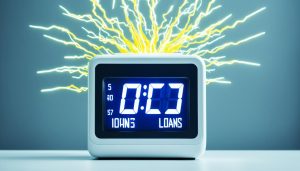Welcome to our guide on navigating the pre-approval process for a mortgage with Chase. If you’re ready to take the exciting step towards homeownership, getting pre-approved can help streamline the process and give you a clearer understanding of your financial capabilities. However, it’s important to understand the requirements and potential challenges associated with the Chase mortgage pre-approval process.
At Chase, we understand that some customers have experienced delays in receiving their pre-approval letters, causing frustration and uncertainty. We want to assure you that we are committed to delivering a smooth and efficient experience. Communication is key, so make sure to clearly communicate your timeline and urgency to your dedicated Lending Advisor.
Chase offers affordable down-payment options and specific down-payment assistance programs designed to bridge the racial wealth gap in homeownership among Black communities. We believe in providing equal opportunities and supporting diverse homebuyers on their homeownership journey.
Key Takeaways:
- Chase’s pre-approval process can help streamline your homebuying experience.
- Communication with your Lending Advisor is crucial to ensure a smooth process.
- Chase offers low down-payment options and down-payment assistance programs for Black homebuyers.
The Benefits of Chase Mortgage Preapproval
Chase mortgage preapproval offers several benefits to homebuyers. Preapproval gives you a clear understanding of how much you can afford, allowing you to shop for homes within your budget. With a preapproval letter in hand, you are seen as a serious and competitive buyer by sellers and real estate agents. This can give you an advantage in a competitive housing market. However, it is important to note that preapproval does not guarantee a mortgage loan. The final approval will depend on factors such as the appraisal of the property and the underwriting process.
When you obtain preapproval for a mortgage with Chase, you gain the confidence and knowledge necessary to navigate the homebuying process. Having a clear budget in mind helps you focus your search on homes that are within your financial range. This can save you time and avoid disappointment by ensuring you only consider properties that you can realistically afford.
Furthermore, being preapproved by Chase can make you a more attractive buyer in the eyes of sellers and real estate agents. It shows that you have taken the necessary steps to secure financing and are serious about making a purchase. In a competitive housing market, where multiple buyers may be interested in the same property, being preapproved can give you an edge. Sellers are more likely to consider offers from preapproved buyers because they know that the financing is already in progress.
Chase’s mortgage preapproval process is designed to streamline the path to homeownership and provide you with a clear understanding of your financial options. However, it is important to remember that preapproval is not a guarantee of a mortgage loan. The final approval will depend on various factors, including the property’s appraisal value and the underwriting process.
Benefits of Chase Mortgage Preapproval:
- Clear understanding of your budget
- Ability to shop for homes within your price range
- Positioning as a serious and competitive buyer
- Advantage in a competitive housing market
Having a preapproval letter from Chase can give you confidence and peace of mind as you navigate the homebuying process. It is an important step that can set you apart from other buyers and increase your chances of securing your dream home.
The Prequalification Process with Chase Mortgage
Before you can get preapproved for a mortgage with Chase, you will need to go through the prequalification process. This preliminary step is designed to give you a clear understanding of your financial position and what you can afford.
During the prequalification process, you will provide information about your income, employment history, assets, and debts. This information will be evaluated by Chase to determine your creditworthiness and estimate the maximum loan amount you may qualify for.
Prequalification is an important step in the homebuying process as it helps you set realistic expectations and plan your budget accordingly. By knowing the maximum loan amount you may qualify for, you can search for homes within your price range and avoid disappointment.
“Prequalification is like dipping your toe in the water. It gives you an idea of what you can afford and helps you start your homebuying journey with confidence.”
It’s important to note that prequalification does not guarantee a mortgage loan. However, it does provide a starting point and a sense of what you can afford. It also demonstrates to sellers and real estate agents that you are a serious buyer, potentially giving you an advantage in a competitive housing market.
If you’re considering applying for mortgage preapproval with Chase, going through the prequalification process is a crucial first step. It allows you to gather the necessary information and have a clear understanding of your financial position before proceeding to the preapproval stage.
Prequalification vs. Preapproval: What’s the Difference?
While prequalification and preapproval are often used interchangeably, they are actually two separate stages in the mortgage application process. Prequalification, as mentioned earlier, is a preliminary assessment of your financial position based on the information you provide.
On the other hand, preapproval involves a more in-depth evaluation of your financial documents and credit history. It typically requires documentation such as bank statements, pay stubs, tax returns, and a credit check. Preapproval provides a stronger indication of your ability to secure a mortgage loan as it involves a thorough analysis of your finances by the lender.
It’s important to keep in mind that both prequalification and preapproval are subject to final underwriting and the property appraisal. These factors, along with other eligibility requirements, will ultimately determine whether you are approved for a mortgage loan.
Chase Mortgage Prequalification Process: Key Steps
The prequalification process with Chase Mortgage generally involves the following key steps:
- Submit your information: Fill out the prequalification application form and provide accurate details about your income, employment, assets, and debts.
- Evaluate your creditworthiness: Chase will assess your financial information to determine your creditworthiness and determine the loan amount you may qualify for.
- Receive prequalification results: Once your application has been reviewed, you will receive a summary of your prequalification results, including the estimated loan amount you may qualify for.
By following these key steps, you can complete the prequalification process with Chase Mortgage and gain valuable insights into your financial position. This information will help you make informed decisions as you move forward with your homebuying journey.

| Advantages | Considerations |
|---|---|
| Provides a clear understanding of your financial position | Prequalification is not a guarantee of mortgage approval |
| Helps you determine a realistic budget for your home search | The loan amount may change based on the final underwriting and property appraisal |
| Positions you as a serious buyer to sellers and real estate agents | Additional documentation and verification will be required for preapproval |
| Can give you a competitive edge in a hot housing market | Interest rates and loan programs may vary |
Requirements for Chase Mortgage Loan Preapproval
When it comes to obtaining a mortgage loan preapproval with Chase, there are certain requirements that borrowers must meet. These requirements are put in place to ensure that borrowers have the financial stability and capacity to handle the responsibilities of homeownership. By meeting these requirements, you can increase your chances of getting preapproved and moving closer to your dream home.
Minimum Credit Score
One of the key requirements for Chase mortgage loan preapproval is maintaining a minimum credit score. A good credit score demonstrates your financial responsibility and ability to manage debt. Although the specific minimum credit score may vary depending on the type of mortgage loan and other factors, it’s generally recommended to have a credit score of at least **650** or higher.
Stable Employment History
In order to qualify for mortgage loan preapproval with Chase, having a stable employment history is essential. Lenders want to see that you have a reliable source of income to support your mortgage payments. A steady employment record, with at least two years of consecutive employment in the same field, can help strengthen your application and increase your chances of preapproval.
Debt-to-Income Ratio
Your debt-to-income (DTI) ratio is an important factor that lenders consider when reviewing your preapproval application. This ratio compares your monthly debt payments to your gross monthly income. Chase typically requires a DTI ratio of **43%** or lower, although certain mortgage loan programs may have different requirements. Maintaining a low DTI ratio demonstrates your ability to manage your debts and suggests that you have sufficient income to afford mortgage payments.
Sufficient Assets
In addition to credit score, employment history, and DTI ratio, Chase also requires borrowers to have sufficient assets for a down payment and closing costs. The specific amount of assets needed will depend on various factors, including the type of mortgage loan and the borrower’s financial situation. It’s important to consult with a Chase Lending Advisor to understand the specific asset requirements for your preapproval application.
Consult with Chase Lending Advisor
While these are some of the general requirements for Chase mortgage loan preapproval, it’s important to remember that each borrower’s situation may be unique. Consulting with a Chase Lending Advisor can provide you with personalized guidance based on your specific financial situation and the type of mortgage loan you’re interested in. They can help you navigate through the application process, understand the requirements, and give you the best chance of securing a mortgage loan preapproval with Chase.

Conclusion
Navigating the Chase mortgage loan preapproval process is an important step towards achieving your dream of homeownership. While some customers may have encountered delays in the preapproval process, it’s crucial to maintain open communication with your dedicated Chase Lending Advisor.
Obtaining a preapproval has several advantages, including gaining a clear understanding of your budget and positioning yourself as a serious buyer in the housing market. The prequalification process and meeting the necessary requirements for preapproval are fundamental steps in this journey. By familiarizing yourself with these requirements and fulfilling them, you can significantly increase your chances of securing a mortgage loan with Chase.
Remember to discuss your timeline and expectations with your Lending Advisor to ensure a smooth and efficient process. Chase is committed to providing support and guidance to help you navigate the preapproval process and achieve your homeownership goals.




No comments! Be the first commenter?